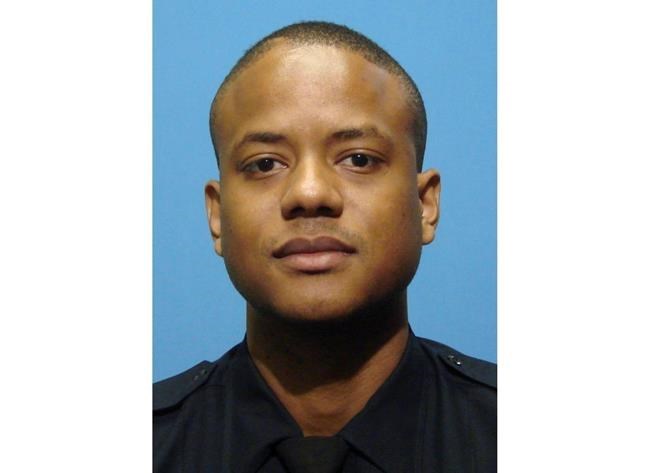
FILE - This undated file photo provided by the Baltimore Police Department shows Jemell Rayam. Rayam, a disgraced Baltimore police detective who led a double life as a drug gang collaborator, has been sentenced to 10 years in federal prison for his role on an out-of-control unit of city officers who resold looted narcotics, conducted brazen robberies, and falsified evidence. (Baltimore Police Department via AP, File)
Republished February 12, 2019 - 2:05 PM
Original Publication Date February 12, 2019 - 10:11 AM
BALTIMORE - A disgraced Baltimore police detective who led a double life as a drug gang collaborator has been sentenced to 10 years in federal prison for his role on an out-of-control unit of city officers who resold looted narcotics, conducted brazen robberies, and falsified evidence.
Momodu Gondo, who joined the police force in 2005 and was referred to as "G Money" in wiretapped calls, was sentenced on Tuesday in a federal courtroom after reaching a plea deal with prosecutors on charges of racketeering and conspiracy to distribute heroin.
As part of his plea deal, he admitted to numerous crimes, including acting as a lookout during a home invasion, selling a seized handgun, and participating in eight robberies as an armed officer.
From the stand in U.S. District Court, Gondo last year testified that he robbed money on the job for years, never sweating internal affairs. "It was just part of the culture," he testified.
On Tuesday, Gondo became the seventh member of the disbanded police unit called the Gun Trace Task Force to be sentenced in the U.S. racketeering investigation that is a far-from-settled corruption saga. The unit's leader, former police Sgt. Wayne Jenkins, got the stiffest sentence: 25 years.
In Gondo's case, federal prosecutors asked for 10 years imprisonment, citing his co-operation and "powerful testimony" against others. But Assistant U.S. Attorney Leo Wise also noted that Gondo's actions helped tear the fabric of community trust in the city's sworn protectors.
"If we can't expect sworn police officers to respect the law then we're truly lost," Wise said.
Defence lawyer Warren Brown had sought seven years, citing his client's extensive co-operation with the government's case. Overall, he congratulated prosecutors on the racketeering case, saying it exposed the "seedy underbelly of the police department."
Wearing an orange jail jumpsuit and sporting a beard, Gondo stood in U.S. District Court in Baltimore to apologize to the city for his crimes and say he was "truly remorseful."
Referring to his co-operation with the government, U.S. District Judge Catherine Blake said he displayed an "extraordinary acceptance of responsibility" and sentenced Gondo to 121 months for racketeering and 120 months on conspiracy to distribute heroin, to run concurrently. She imposed four years of supervised release and agreed that restitution would be addressed at a later date.
Gondo was the only member of the Gun Trace Task Force to be charged in a separate criminal case, a heroin trafficking investigation that ultimately led federal investigators to their racketeering conspiracy probe into the Baltimore police unit.
In that case, focusing on a Baltimore drug crew, Gondo was a co-defendant. Gondo massively aided the drug-dealing organization for years, even running interference for them so they could avoid the very same unit of corrupt cops he belonged to.
Prosecutors said Gondo provided protection and sensitive information to members of the drug trafficking organization — which included a childhood buddy — and even informed them that federal agents hid a tracking device on one of their cars.
The only disgraced unit detective yet to receive sentencing is Jemell Rayam, Gondo's former police partner. Rayam, who also co-operated with the government, testified that Gondo, who was shot multiple times outside his home in 2006, just two months out of the police academy, was actually shot by fellow drug dealers. At the time, a police commander told TV cameras that Gondo was a "very well-respected rookie."
Outside the courthouse, Gondo's lawyer Brown suggested federal investigators were stymied in their efforts to go after the task force's commanders at the Baltimore Police Department and failed to "unlock the key to the penthouse" to expose potential corruption by police higher-ups.
"They were always trying to get past this unit to their superiors," Brown alleged to reporters.
___
Follow McFadden on Twitter: https://twitter.com/dmcfadd
News from © The Associated Press, 2019